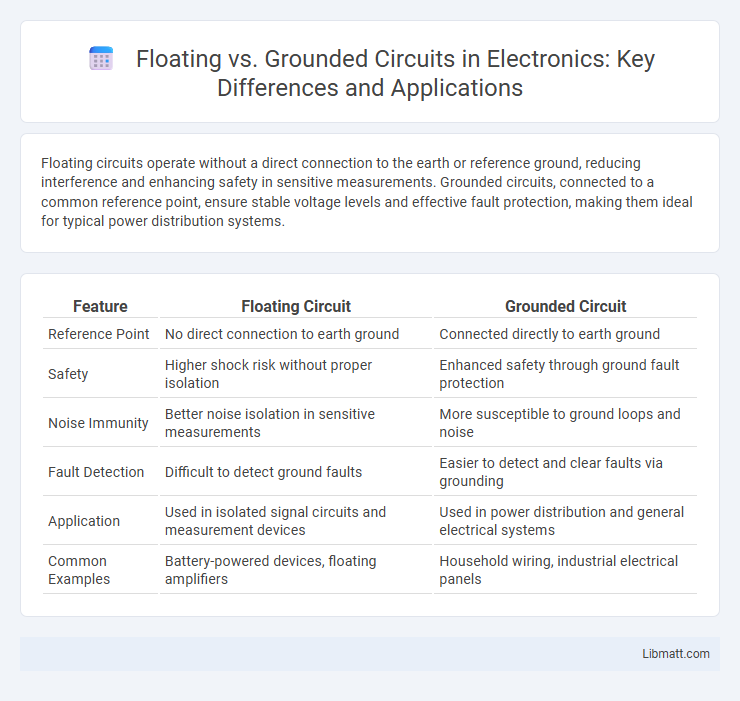Floating circuits operate without a direct connection to the earth or reference ground, reducing interference and enhancing safety in sensitive measurements. Grounded circuits, connected to a common reference point, ensure stable voltage levels and effective fault protection, making them ideal for typical power distribution systems.
Table of Comparison
| Feature | Floating Circuit | Grounded Circuit |
|---|---|---|
| Reference Point | No direct connection to earth ground | Connected directly to earth ground |
| Safety | Higher shock risk without proper isolation | Enhanced safety through ground fault protection |
| Noise Immunity | Better noise isolation in sensitive measurements | More susceptible to ground loops and noise |
| Fault Detection | Difficult to detect ground faults | Easier to detect and clear faults via grounding |
| Application | Used in isolated signal circuits and measurement devices | Used in power distribution and general electrical systems |
| Common Examples | Battery-powered devices, floating amplifiers | Household wiring, industrial electrical panels |
Introduction to Floating and Grounded Circuits
Floating circuits operate without a direct connection to the earth or ground reference, enhancing isolation and reducing potential noise interference in sensitive electronic applications. Grounded circuits connect one point to the earth, providing a stable reference voltage that helps ensure safety and consistent operation in power distribution and signal processing systems. Understanding the distinctions between floating and grounded circuits is crucial for optimizing electrical system design, minimizing interference, and ensuring protection against electrical faults.
Definition of Floating Circuit
A floating circuit is an electrical circuit that is not connected to a reference ground or earth potential, allowing it to operate independently of the main power system. This isolation minimizes interference and reduces the risk of ground loops, making floating circuits ideal for sensitive measurement and signal processing applications. Your devices can benefit from improved noise immunity and enhanced safety when utilizing floating circuit designs.
Definition of Grounded Circuit
A grounded circuit is an electrical circuit that has a direct connection to the earth or a reference point, providing a stable voltage level and a path for fault currents to safely dissipate. This grounding enhances safety by preventing electrical shock and equipment damage during electrical faults. Grounded circuits are commonly used in residential and industrial power systems to ensure consistent voltage and reliable operation.
Key Differences Between Floating and Grounded Circuits
Floating circuits operate without a direct connection to the earth or ground, allowing them to isolate from potential voltage spikes and reduce electromagnetic interference, whereas grounded circuits provide a stable reference point by connecting directly to the earth for safety and noise reduction. Floating circuits are ideal in measurement systems to prevent ground loops, while grounded circuits are preferred in power distribution to ensure user safety and system stability. Understanding these key differences helps you choose the appropriate circuit type based on application requirements and safety considerations.
Advantages of Floating Circuits
Floating circuits provide enhanced safety by isolating the electrical system from ground, reducing the risk of electric shock and minimizing ground loop interference. They offer improved noise immunity in sensitive signal processing applications, ensuring accurate and reliable measurements. These circuits are crucial in fault-tolerant designs, allowing operation to continue even if one path to ground is compromised.
Advantages of Grounded Circuits
Grounded circuits provide enhanced safety by preventing electrical shock hazards through effective fault current pathways, reducing the risk of equipment damage and fire. They offer stable reference points for system voltages, improving the accuracy of fault detection and system protection devices. Your electrical system benefits from easier troubleshooting and maintenance due to consistent grounding standards that help isolate issues rapidly.
Safety Considerations: Floating vs Grounded
Floating circuits, isolated from earth ground, reduce the risk of electric shock by preventing current flow through unintended paths, enhancing operator safety in sensitive equipment environments. Grounded circuits provide a low-resistance path to earth, which aids in fault current dissipation and helps activate protective devices, minimizing fire hazards and equipment damage. Proper selection between floating and grounded circuits depends on device sensitivity, environmental conditions, and compliance with safety standards like IEC 60364 or NEC guidelines.
Common Applications of Floating Circuits
Floating circuits are commonly used in medical devices to enhance patient safety by preventing electrical shocks during procedures such as electrocardiograms and defibrillation. They are also prevalent in isolation amplifiers and instrumentation systems where preventing ground loops and reducing noise is critical for accurate signal measurement. In power systems, floating circuits help detect ground faults and protect sensitive equipment by isolating electrical components from the earth ground.
Common Applications of Grounded Circuits
Grounded circuits are commonly used in residential and commercial electrical systems to ensure safety and prevent electrical shocks by providing a clear path for fault currents. Industrial machinery frequently employs grounded circuits to protect sensitive equipment and maintain system stability during electrical disturbances. Your electrical installations benefit from grounded circuits by reducing the risk of damage from short circuits and enhancing overall operational reliability.
Choosing the Right Circuit Type for Your Project
Choosing the right circuit type for your project depends on the specific application and safety requirements. Floating circuits, isolated from ground, reduce noise and prevent unintended current paths, making them ideal for sensitive measurements or medical devices. Grounded circuits provide a stable reference point, enhancing safety and simplifying troubleshooting in power distribution or high-voltage systems.
Floating vs Grounded Circuit Infographic

 libmatt.com
libmatt.com